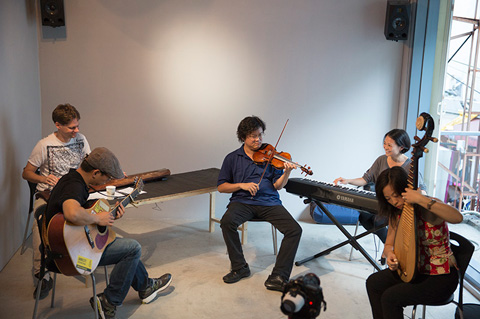Hong-Kai Wang is an artist who works mainly with sound. Her practice includes processes involved in the production and performance of sound as well as their political and social contexts, and, not least, the organisation of listening. In several of her pieces she has employed collective processes, discussions and workshops.
Artist website:
http://www.w-h-k.net

“My academic training was in political science. I think my interest in sound actually stems from my own social alienation in New York as a foreigner, while trying to learn English. To try to understand, or even speculate about, all of the confusing sound and information around me became very important to me. It became a form of agency, a daily existence. This is why the idea of listening as a form of organization is pivotal to me. We all understand that listening is a very private and personal thing, but I’m actually interested in how it can be shared, and how we relate to one another and negotiate understandings and misunderstandings—and also how we don’t.”

“The Broken Orchestra Live in Stockholm uses the Austrian modern composer Arnold Schoenberg’s famous quip ‘My music is not really modern, just badly played’ as its formal performative directive, by inviting several professional musicians on different instruments to respond to and reinterpret a childhood recording of Bach’s ‘Ave Maria’ as performed by my brother and me.”

Music While We Work
2011
Multichannel sound and double-channel video installation
In her project Music While We Work, Wang transcends the simple soundscape production method of subjective documentation, by using recording as both a subject and an application tool for discussing the political nature of sound. In the first stage, she returned to her hometown of Huwei in Yunlin County, where she joined forces with a century-old sugar factory. She invited retired workers in the town back to the factory, where they collectively participated in several sound workshops learning to use recording equipment step-by-step. Gradually, Wang handed over the equipment to the retired workers and their families, allowing them to work on their own, identifying and recording the sounds of their former work environment – their aural universe. Wang believes that whoever holds the microphone and what she or he records delineates, from different viewpoints, the right to speak, the right to interpret, and the power relationships between sound-maker and recipient. During the second post-production stage, she and her collaborators altered these sounds by means of “artistic manipulation”, reconstructing them at a new level of meaning as an artwork. Regarding this, Wang says, “Most of my early works were only subjective expressions of life experiences. In the past year, I’ve turned to exploring collective experiences. When doing this, it isn’t enough to explore my relationship with the larger environment or to use this as a metaphor. And it’s not enough for the artist to serve as a mediator. Through the intervention of art, I hope to trigger certain things, to help certain things materialize, and to explore what influences this can bring about”.
Text by Amy Cheng

